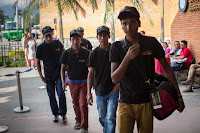“I’m Phudoma (35) and I’ve been working as a trekking guide since I was 27. Coming to Kathmandu, I really didn’t know where to start. I first worked in hotels, making very little money. Then I went abroad for two years to work as a housekeeper. When I came back, I got an arranged marriage. My husband is also a trekking guide. Initially, I accompanied him on treks as assistant guide, making 5 EUR per day. After three years of marriage, I got a daughter. I didn’t get any maternity leave, because trekking is a seasonal activity. As a woman, I don’t get a lot of offers, maybe once or twice a season, making 1.700 NPR (17 EUR) per day. The months I do not work as guide, I often go back home to help my parents farming. Trekking is dangerous business and not a season goes by without some of us getting injured or dying. I was lucky enough never to have had any accident. Seven years ago I joined the trade union UNITRAV, affiliated to GEFONT, to improve my salary. Later I was elected as secretary of UNITRAV. They asked me to try to organize more female members, by training them as guides. We also try to organize the ladies working in the tea houses along trekking routes, as they can be potential guides or porters”.
This testimony was collected during the Nepal Express, a group trip organized by WSM in Nepal with 16 Flemish people from 21 Sept till 6 Oct. 2019. The trip, unlike many other immersion trips, focused on empathy, experience and challenges. Before even their arrival, each participant collected 2.000EUR to support WSM's Nepali partners. One of the portraits used by them to explain the realities in Nepal to their friends and family was of Doma Sherpa, a guide with UNITRAV, affiliated to GEFONT.
Having talked so often about her, the group was thrilled to have Doma be one of the guides while trekking. She explained that the bargaining power of guides used to be very little. Guides and porters would accept any offer. Since they became organized, they have made demands from the Travel Tours Association from Nepal (TAAN), which led to improvements in terms of salaries, insurance, shelter etc. In 2011, the salary for an assistant guide was 500 NPR (3,78 EUR). Since 2017, through negotiations, they obtained a minimum wage of 1.700 NPR (12,87 EUR) for guides and porters. Also the insurance for guides and partners had to be negotiated. Now, besides hospitality expenses, they have obtained fixed amounts per injury or death, which should apply automatically.
Afterwards one of the participants of the Nepal Express wrote this: “With mixed feelings, we return home. Happy for so many unforgettable experiences, but also a bit melancholic to leave this wonderful country and its incredibly friendly people. One thing is certain: each of us has a piece of Nepal in us for the rest of our lives.” See their pictures and updates form the trip on their Facebook page.
This testimony was collected during the Nepal Express, a group trip organized by WSM in Nepal with 16 Flemish people from 21 Sept till 6 Oct. 2019. The trip, unlike many other immersion trips, focused on empathy, experience and challenges. Before even their arrival, each participant collected 2.000EUR to support WSM's Nepali partners. One of the portraits used by them to explain the realities in Nepal to their friends and family was of Doma Sherpa, a guide with UNITRAV, affiliated to GEFONT.
Having talked so often about her, the group was thrilled to have Doma be one of the guides while trekking. She explained that the bargaining power of guides used to be very little. Guides and porters would accept any offer. Since they became organized, they have made demands from the Travel Tours Association from Nepal (TAAN), which led to improvements in terms of salaries, insurance, shelter etc. In 2011, the salary for an assistant guide was 500 NPR (3,78 EUR). Since 2017, through negotiations, they obtained a minimum wage of 1.700 NPR (12,87 EUR) for guides and porters. Also the insurance for guides and partners had to be negotiated. Now, besides hospitality expenses, they have obtained fixed amounts per injury or death, which should apply automatically.
Afterwards one of the participants of the Nepal Express wrote this: “With mixed feelings, we return home. Happy for so many unforgettable experiences, but also a bit melancholic to leave this wonderful country and its incredibly friendly people. One thing is certain: each of us has a piece of Nepal in us for the rest of our lives.” See their pictures and updates form the trip on their Facebook page.














